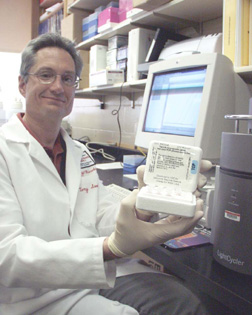 |
Tony Sambol holds one of the kits the Nebraska Health and Human Services System Nebraska Public Health Laboratory will use to detect the smallpox virus. |
The addition of smallpox brings the number of different agents identified by the CDC as high priority in bioterrorism preparedness to 11.
“Nebraska strives to be a leader in bioterrorism preparedness in all aspects,” said Joann Schaefer M.D., deputy chief medical officer, Nebraska Health and Human Services System. “We believe preparedness is the best deterrent to someone who would plan on using a bioterror agent. We also believe Nebraskans feel more secure about their safety knowing public officials are prepared.”
Tony Sambol, coordinator of special pathogens and bio-security laboratory sections of the Nebraska Department of Health and Human Services System’s NPHL located at UNMC, said specialists in the lab recently received the notice and have received reagents, or test kits, for the smallpox virus.
“This is a continuation of technology transfer from the CDC to state public health labs,” he said.
Of the 110 labs in the CDC’s nationwide Laboratory Response Network, Sambol said 30 applied last year to be part of a multi-site study to test the validity of the smallpox kits. Of the 30, 23, which included the lab at UNMC, met the criteria and now are certified to test for smallpox, he said.
With use of the kits, the capability to provide fast and reliable tests is enhanced by the Roche Molecular Biochemical LightCycler equipment, which allows pathologists and microbiologists to get results of laboratory tests in a fraction of the time. The technology is an application of biology and engineering and was purchased after the Sept. 11, 2001, terrorist attacks through a grant from the CDC.
“It’s been tremendous,” Sambol said. “We’ve been able to test for quite a number of these agents for bioterroism and get same day results. It’s important for patient treatment, saving lives and deciding whether or not there is a need to quarantine.”
Soon, the NPHL will receive kits from the CDC that will enable it to test for the highly publicized Severe Acute Respiratory Syndrome (SARS), Sambol said. The CDC is the only lab currently that can confirm patient test results for suspected cases of SARS. “Like the smallpox testing capability, we will be able to test for SARS right here in our bio-safety level 3 lab in less than half the time it takes to send it to the CDC.”